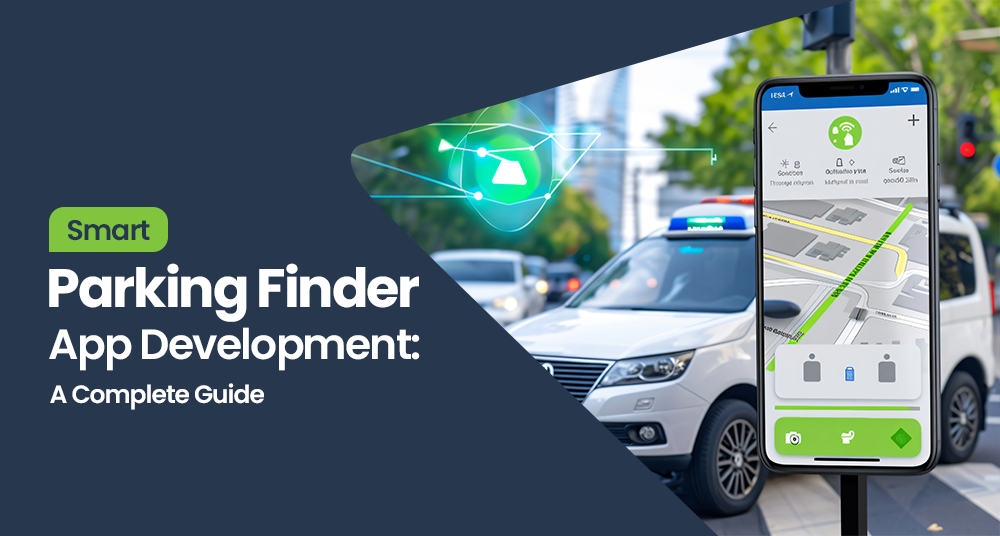Still forcing drivers to play hide-and-seek with parking spots while your competitors are guiding them like air traffic control? If your parking experience relies on luck, you’re already behind.
In an era where consumers can track pizza to their doorstep and predict traffic down to the minute, parking should not feel like a gamble. Enter AI-powered Smart Parking Finder App Development—a game-changing solution transforming urban mobility, logistics, and customer experience.
Whether you’re managing a mall, airport, logistics hub, or planning a smart city infrastructure, AI parking apps are no longer optional—they’re essential. This guide dives deep into why smart parking apps matter, the features they need, development costs, monetization strategies, and trends shaping the future.
Why AI Parking Finder Apps Are Critical for Smart Cities?
Urban parking today is often a frustrating experience. Drivers waste time circling blocks, garages sit underutilized, and cities experience congestion, pollution, and stress.
Urban Parking Challenges
| Challenge | Current Impact |
| Rising Vehicle Density | More cars per square mile than ever before; congestion peaks during rush hours. |
| Limited Parking Availability | Drivers spend 10–20 minutes searching for spots, increasing fuel usage and carbon footprint. |
| Driver Expectations | Consumers expect instant, app-enabled, seamless experiences similar to Uber, food delivery, and ride-sharing apps. |
The Opportunity
AI-powered parking apps streamline urban mobility by predicting parking availability, optimizing space usage, and providing real-time guidance. Benefits include reduced traffic congestion, lower emissions, and improved user satisfaction.
Market Insights: The Opportunity in Numbers
The global smart parking systems market is projected to reach USD 30.16 billion by 2030, growing at a CAGR of 22.1% from 2023–2030.
Key insights:
- Commercial Properties & Malls: AI parking solutions can reduce congestion by 40% during peak hours.
- Airports: Efficient parking allocation improves passenger satisfaction and boosts premium parking revenue.
- Smart Cities: Real-time parking data informs traffic management and urban planning.
Businesses adopting AI-powered parking solutions can increase revenue, improve customer satisfaction, and leverage predictive analytics to optimize operations.
Who Benefits from AI Parking Finder Apps?
Smart parking isn’t just for cities—it’s a revenue-generating, efficiency-boosting tool for multiple industries:
| Industry | Use Case | Value |
| Malls & Retail Chains | Manage large lots during peak hours | Boost foot traffic, reduce congestion |
| Hospitals & Healthcare | Reduce patient & staff parking stress | Faster turnover, better allocation |
| Airports & Transit Hubs | Real-time updates for short- and long-term parking | Smooth traffic flow, monetize premium spots |
| Logistics & Warehouses | Optimize fleet turnaround | Minimized delays, improved scheduling |
| Smart City Planners | Integrate parking data into public mobility systems | Lower congestion, informed infrastructure decisions |
| Commercial Real Estate Developers | Add technology-driven value to properties | Increase ROI, attract high-end tenants |
Case Example:
At Dubai International Airport, AI-based parking optimization reduced the average time to find a spot by 35%, leading to higher customer satisfaction and increased revenue from premium parking tiers.
Must-Have Features for AI Smart Parking Finder App Development
A smart parking app is only as good as the features it provides. Here’s a detailed breakdown:
Basic Features
| Feature | Description | Benefit |
| Real-Time Space Availability | Display live availability | Reduces guesswork and traffic congestion |
| Search by Location/Destination | Find parking near venues | Convenience & time-saving |
| Navigation & Directions | Turn-by-turn guidance | Integrates parking into overall journey |
| Booking/Reservation | Reserve spots ahead | Predictable parking experience |
| Digital Payments | Cards, wallets, UPI | Seamless checkout & reduced cash handling |
| Push Notifications | Alerts for expiring sessions & availability | User engagement & trust |
| Rating & Review System | User feedback on locations | Community credibility & insights |
Advanced Features
| Feature | Description | Benefit |
| AI-Based Availability Forecasting | Predict availability using historical & live data | Reduces friction & uncertainty |
| License Plate Recognition (LPR) | Contactless entry/exit via cameras | Security & automation |
| Dynamic Pricing Engine | Adjust prices based on demand/events | Maximizes revenue |
| Personalized Spot Suggestions | Learn user preferences | Increases loyalty |
| Multi-Location Management | Admin dashboard for multiple facilities | Efficient operations |
| In-App Route Optimization | Smart routing inside garages | Prevent congestion |
| Analytics Dashboard | Insights on occupancy & revenue | Data-driven decisions |
Bonus Next-Gen Features
- EV Charging Spot Detection: Attract electric vehicle drivers.
- Voice Assistant Integration: Hands-free navigation and booking.
- AR Navigation: Guide drivers inside garages visually.
- Crowdsourced Spot Reporting: Real-time updates from users.
- Blockchain for Access Logs: Transparent vehicle tracking.
- Car Wash / Add-On Services: Monetize additional offerings.
Benefits of AI Parking Finder Apps
For Drivers
- Save time with predictive availability
- Reserve spots in advance
- Personalized spot suggestions
- Seamless payments
- In-app navigation to assigned spaces
- Real-time alerts for better planning
For Parking Operators
- Maximize occupancy
- Reduce staffing costs
- Increase revenue via dynamic pricing & add-ons
- Monitor lot health in real-time
- Upsell EV charging, premium spots, or valet services
For City Planners
- Reduced congestion & improved traffic flow
- Better air quality and lower emissions
- Geo-based demand heatmaps for urban planning
- Data integration into mobility ecosystems
- Public safety and infrastructure optimization
Step-by-Step Process to Build an AI Parking Finder App
Step 1: Research & Requirement Gathering
- Market analysis: Identify target users & competitors
- Feature scoping: MVP vs full-scale solution
- Audience segmentation: Retail, enterprise, public sector
Step 2: UI/UX Design
- Driver-centric design with easy navigation
- Admin dashboard for operators
- Mobile-first & accessible interface
Step 3: Frontend & Backend Development
- Frontend: Flutter or React Native
- Backend: Node.js or Python (FastAPI)
- Mapping: Google Maps API, Mapbox
- Real-time data: Firebase or WebSockets
Step 4: AI/ML Integration
- Predictive models for parking availability
- License Plate Recognition (LPR) via OpenCV/YOLO
- Personalized recommendations through clustering algorithms
Step 5: Integration with Parking Infrastructure
- IoT sensors: Ultrasonic, infrared, magnetometers
- LPR cameras
- Smart barrier gates
Step 6: Testing & QA
- Functional & performance testing
- Real-world field testing
- Security audits
Step 7: Deployment
- Cloud hosting (AWS, GCP, Azure)
- Soft launch & early access feedback
Step 8: Post-Launch Maintenance
- AI model retraining
- Infrastructure monitoring
- Bug fixes & updates
Recommended Tech Stack
| Component | Tools / Frameworks |
| Frontend | Flutter, React Native, React.js |
| Backend | Node.js, Python (FastAPI) |
| Database | MongoDB, PostgreSQL |
| Mapping | Google Maps, Mapbox |
| AI/ML | TensorFlow, PyTorch, OpenCV, YOLOv8 |
| Cloud Hosting | AWS, GCP, Azure |
| Real-Time Layer | Firebase, WebSockets |
Cost to Develop an AI Parking Finder App
| Version | Cost Range | Features Included |
| MVP | $70,000–$100,000 | Real-time availability, booking, navigation, payments, basic backend & UI/UX |
| Advanced | $120,000–$180,000 | AI predictions, LPR, dynamic pricing, multi-location dashboards |
| Enterprise | $200,000–$300,000+ | IoT integration, edge AI, full compliance, EV & public transit integration, white-label |
Additional Costs:
- Sensors & hardware: $30–$100 per spot
- Cloud infrastructure: $250–$1,000/month
- AI maintenance: $1,500–$3,000/month
- Compliance & security audits: $5,000–$10,000/year
Monetization Strategies
- Pay-Per-Use / Booking Fees
- Subscription Plans for regular users
- Dynamic Pricing Commissions for high-demand periods
- White-Label Licensing for property developers
- Advertising & Sponsored Listings
- API as a Product / Data Monetization
- Add-On Services: EV charging, valet, car wash, maintenance packages
Key Trends in 2025 and Beyond
- Integration with autonomous vehicles
- AR-assisted navigation inside parking garages
- EV-friendly parking & charging spot prioritization
- AI-powered hyper-personalization for frequent users
- Data monetization through blockchain-secured insights
- Seamless connection with smart mobility ecosystems
Challenges in Development & How to Solve Them
| Challenge | Solution |
| Data Accuracy | Combine IoT, crowdsourced, and camera feeds |
| Sensor Reliability | Use robust LoRaWAN/infrared devices & CV fallback |
| Scalability | Cloud-native, multi-tenant architecture |
| Computer Vision Complexity | Optimize cameras, use edge computing |
| User Trust | Transparent onboarding & privacy controls |
| Security Risks | End-to-end encryption, OAuth 2.0, role-based access |
Wrapping Up
Smart parking is not a luxury—it’s a necessity for modern cities, commercial businesses, and forward-thinking entrepreneurs.
From real-time spot detection to predictive AI, IoT integration, and dynamic monetization, building a smart parking finder app positions your business at the intersection of technology, convenience, and revenue generation.
Investing in AI-powered parking solutions now ensures you maximize occupancy, reduce congestion, and future-proof urban mobility.
FAQs
How long to develop a smart parking app?
10–14 weeks for MVP; 5–7 months for enterprise-grade solutions.
Can it integrate with existing gates or parking software?
Yes, via APIs or middleware integration.
What data is needed for AI?
Historical occupancy, real-time sensor data, user behavior logs.
Can it scale across multiple cities?
Yes, with modular, cloud-native architecture.
Are multiple user types supported?
Yes, driver, admin, attendant, and city planners can have custom interfaces.
Are LPR cameras regulated?
Yes, compliance with GDPR, CCPA, and local laws is essential.
Related Blog: Taxi Booking App Development Guide






What do you think?
It is nice to know your opinion. Leave a comment.